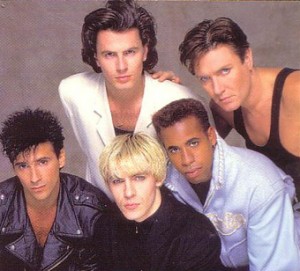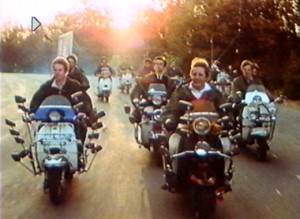Duran Duran’s John Taylor vs. The Twitterati
 Mr. Taylor spoke at UCLA (University of California, Los Angeles – for our English chums), and gave the opinion that
Mr. Taylor spoke at UCLA (University of California, Los Angeles – for our English chums), and gave the opinion that
“When artists today are asked to Twitter their every thought, their every action, to record on video their every breath, their every performance, I believe they’re diluting their creative powers, their creative potency and the durability of their work. And in the long run I believe they’re also diluting the magical power and the magnetic attraction that they can or will ever have over their audience.”
While I agree that a lot of the glamour that the bands of yesteryear had (even the grimy, anti-glamour punks had a kind of anti-heroic superhuman mystique) I don’t think that accessibility necessarily devalues a band’s efforts. The megastars of today have carefully managed social network strategies with ghost-tweeters and myspace account managers making sure that fans feel like they are in touch with Brittany’s every motion, and more deeply connected because of that. Even bands lower down the tree can have a rapport with their fans, speak to them personally and instantly, inform them of new gigs, new tracks, new merch or whatever it might be, and get their opinions and feedback just as quickly and intimately. It’s a lot of work, but the relationship between fan and musician is a symbiosis, one that will be continually closer as Web 2.0 channels become more ubiquitous. Perhaps there is something to be regretted in the gradual demise of the ivory tower rock star (watch out for the falling TV’s), but as long as musicians can remember not to air their dirty laundry in public, blog when they’re drunk, and take advantage of the interest and support of their fans I think the closer relationship is a good thing.
Taylor also bemoaned the way that the internet has made so much of yesterday’s culture available that it tends to draw attention away from new musicians’ work.
“…The availability and accessibility of music on the internet today is truly incredible, and I applaud anything that can inspire interest or curiosity in anyone. But this also means that those of us who before would have been looking towards the current culture for inspiration are now often to be found […] in various backwaters of older music. This relative lack of need for current, innovative culture can cause, has caused, is causing – maybe – the innovative culture to slow down, much as an assembly line in Detroit slows down and lay-offs have to be made when the demand for a new model recedes.
 I couldn’t agree less with this negative take on the provision of access to the musical genius of yesteryear. I can appreciate how unique, cool and fad-struck the teenaged guitarist music have felt when Roxy Music strutted onto the Top of The Pops stage, how much that music and glamour defined a generation, and how much of a defocussing there has been since then, but greater choice does in fact equal greater freedom. The enforced cultural desert that he describes in the rest of his speech may have made individual discoveries more rare and exciting, but the freedom to roam and browse through the whole history of recorded music allows the new generation to decide for itself what is good and fascinating – the globalisation of music splits us all into niche groups; the zeitgeist has splintered, and the mods and rockers are now a thousand different sub-cultures, but those groups are more intimate and tighter knit than the superculture used to be, and will become more so as technology allows them to communicate more and faster. In fact this reintroduction of yesterday’s music is pushing a resurgence of creativity in old genres – funk labels like Daptone, reinventions of Acid and conceptual jazz from bands like Polar Bear and Led Bib, whole swathes of Chiptune stuff as people realise how great the soundtracks to the computer games of the 80’s were… This isn’t even taking into consideration that there are more musicians alive and producing today than in any other period of history, given how global population has expanded to this point in time, and all those people are better connected than ever before; what is true is that the stars of today now have to compete with yesterday’s geniuses as well as their peers for attention. Rant over.
I couldn’t agree less with this negative take on the provision of access to the musical genius of yesteryear. I can appreciate how unique, cool and fad-struck the teenaged guitarist music have felt when Roxy Music strutted onto the Top of The Pops stage, how much that music and glamour defined a generation, and how much of a defocussing there has been since then, but greater choice does in fact equal greater freedom. The enforced cultural desert that he describes in the rest of his speech may have made individual discoveries more rare and exciting, but the freedom to roam and browse through the whole history of recorded music allows the new generation to decide for itself what is good and fascinating – the globalisation of music splits us all into niche groups; the zeitgeist has splintered, and the mods and rockers are now a thousand different sub-cultures, but those groups are more intimate and tighter knit than the superculture used to be, and will become more so as technology allows them to communicate more and faster. In fact this reintroduction of yesterday’s music is pushing a resurgence of creativity in old genres – funk labels like Daptone, reinventions of Acid and conceptual jazz from bands like Polar Bear and Led Bib, whole swathes of Chiptune stuff as people realise how great the soundtracks to the computer games of the 80’s were… This isn’t even taking into consideration that there are more musicians alive and producing today than in any other period of history, given how global population has expanded to this point in time, and all those people are better connected than ever before; what is true is that the stars of today now have to compete with yesterday’s geniuses as well as their peers for attention. Rant over.